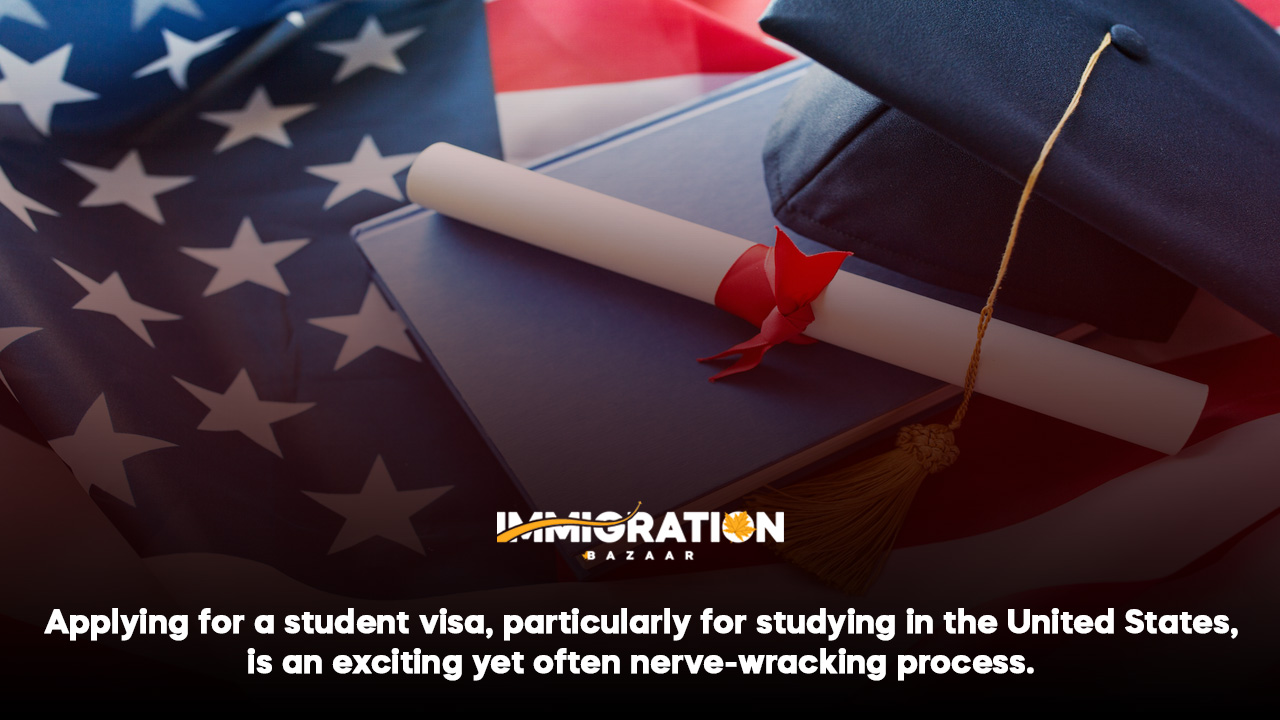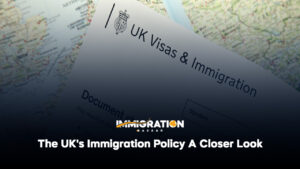Applying for a student visa, particularly for studying in the United States, is an exciting yet often nerve-wracking process. Many students dream of pursuing higher education in the U.S., known for its world-class universities, diverse culture, and ample career opportunities. However, securing a U.S. student visa can sometimes be a daunting task, especially for first-time applicants. The visa interview, document preparation, and understanding what visa officers are looking for can lead to anxiety and uncertainty.
In a recent interview with Chris Ames, a U.S. Embassy representative, several critical insights and tips were shared to help students navigate the visa application process smoothly. Ames emphasized that visa rejection is not something to be feared, as the majority of first-time applicants generally succeed in securing their visas if they approach the process properly. Yet, he noted that certain mistakes or missteps can lead to visa refusals, with one of the most common reasons being the failure to prove strong ties to one’s home country. Ames offered detailed advice for overcoming common challenges, providing all necessary documents, and presenting oneself confidently during the visa interview.
This article delves into those tips, providing a comprehensive guide for first-time student visa applicants.
-
Understand the Purpose of the U.S. Student Visa (F-1 Visa)
Before diving into the specifics of the visa interview or documentation, it is crucial to understand the nature of the F-1 visa, which is the standard visa issued to international students wishing to study full-time in the U.S. The F-1 visa allows students to pursue academic programs, including undergraduate and graduate degrees, at accredited U.S. institutions. It also permits students to stay in the U.S. for the duration of their studies and engage in certain forms of practical training, such as internships, during or after their academic program.
However, the F-1 visa is explicitly non-immigrant, meaning the primary purpose of this visa is to allow students to study in the U.S., after which they are expected to return to their home country. Demonstrating this intent to return home is a central component of the visa interview.
-
Common Reasons for Visa Refusals
While most first-time applicants succeed in securing their U.S. student visa, some face refusals. Understanding why visas are denied can help applicants avoid these pitfalls. Chris Ames pointed out several common reasons for visa refusal:
- Failure to Prove Intent to Return: This is by far the most significant factor leading to visa denials. U.S. immigration law requires that applicants demonstrate strong ties to their home country. This means that the visa officer needs to be convinced that the applicant does not intend to stay in the U.S. permanently and will return home after completing their education.
- Inadequate Financial Documentation: Another frequent reason for refusal is the failure to prove that the student has sufficient financial resources to support themselves during their time in the U.S. Without convincing financial documents, the visa officer may doubt whether the student can afford tuition and living expenses.
- Unclear Academic Intentions: Sometimes students are not able to clearly explain their academic goals or why they chose a particular university or program. This can raise red flags for the visa officer, who may question the legitimacy of the student’s intent to study.
-
Tips for Proving Intent to Return
One of the most crucial elements of the student visa application is proving that you intend to return to your home country after your studies. Here are several ways to effectively demonstrate your ties to your home country during the interview:
- Family Ties: Highlight your family connections in your home country. This could include parents, siblings, or other close relatives who depend on you or with whom you plan to reunite after completing your studies.
- Property Ownership: If you or your family own property in your home country, mention this during the interview. Property ownership is often seen as a strong indicator that you have long-term ties to your home country.
- Career Prospects: Be prepared to talk about your career plans post-graduation. Discuss how your education in the U.S. will benefit you when you return home and how you plan to use the knowledge and skills acquired in the U.S. to advance your career in your home country.
- Return Plans: Provide a clear plan of action for your return after completing your studies. Whether it’s taking over a family business, joining a specific industry, or continuing further studies in your home country, a clear plan reassures visa officers that you do not intend to overstay in the U.S.
-
Financial Documentation Tips
U.S. universities can be expensive, and visa officers are responsible for ensuring that applicants have sufficient funds to cover their tuition and living expenses without needing unauthorized work while in the U.S. To avoid visa denial due to inadequate financial proof, ensure the following:
- Present Clear and Authentic Financial Documents: Provide official bank statements or other financial documents that demonstrate your ability to cover your tuition, fees, and living expenses. Avoid submitting unclear, forged, or suspicious documents, as this could lead to immediate denial.
- Scholarship Proof: If you are receiving a scholarship, bring official documentation confirming the scholarship, including the amount and what it covers (tuition, living expenses, etc.).
- Sponsor’s Financial Details: If your education is being sponsored by someone (such as a family member), make sure to present the sponsor’s financial documents and a letter of sponsorship, explaining their relationship to you and their commitment to your education.
-
Preparing for the Visa Interview
The visa interview is perhaps the most nerve-wracking part of the process, but with the right preparation, you can confidently present your case. Here’s how to get ready for your visa interview:
-
a) Know Your Application Inside-Out
Before heading to your interview, make sure you are thoroughly familiar with every part of your visa application. This includes your university acceptance letter, I-20 form (which confirms your enrollment in a U.S. institution), and any other documents you have submitted.
-
b) Be Ready to Discuss Your Academic Plans
During the interview, visa officers will want to know about your academic goals and why you chose the U.S. for your education. Be prepared to answer questions such as:
- Why did you choose this particular university?
- How does the program you are pursuing fit into your career plans?
- What made you decide to study in the U.S. instead of your home country or another country?
By giving clear, specific answers, you can demonstrate that your educational goals are genuine.
-
c) Demonstrate Confidence Without Arrogance
While it’s natural to feel nervous, try to project confidence during the interview. Make eye contact with the visa officer and provide thoughtful responses. Avoid being overly rehearsed, as this can make you seem disingenuous. However, don’t mistake confidence for arrogance; remain polite and respectful at all times.
-
d) Be Honest
One of the worst things you can do during your visa interview is to lie or exaggerate your answers. If the visa officer catches inconsistencies or dishonesty, your visa will almost certainly be denied. Instead, be transparent about your plans, even if they are not perfect. Visa officers understand that students are young and may not have every detail of their future mapped out.
-
e) Dress Appropriately
While the visa interview is not a formal business meeting, dressing neatly and appropriately shows that you take the process seriously. You don’t need to wear a suit, but business casual attire can leave a good impression on the visa officer.
-
Documentation Checklist
Apart from presenting yourself well at the interview, ensuring that you have all the required documentation is equally critical. Make sure to prepare and carry the following documents:
- Valid Passport: Your passport must be valid for at least six months beyond your period of stay in the U.S.
- DS-160 Form: This is the online non-immigrant visa application form. Make sure to print the confirmation page to bring to your interview.
- Form I-20: This form is issued by the U.S. institution where you are enrolled and is required for your visa application.
- SEVIS Fee Receipt: Before your visa interview, you must pay the SEVIS (Student and Exchange Visitor Information System) fee. Bring the receipt as proof of payment.
- University Admission Letter: A letter from the university confirming your acceptance into the academic program.
- Proof of Financial Support: This includes bank statements, scholarship letters, or sponsor documents that prove you can support yourself financially while studying in the U.S.
- Visa Interview Appointment Confirmation: A confirmation page showing that you have scheduled your visa interview.
- Any Additional Documents: This might include academic transcripts, standardized test scores (such as TOEFL, IELTS, SAT, or GRE), or any other documents requested by the visa officer.
-
What to Do If Your Visa Is Refused
Even with the best preparation, some students may face a visa refusal. If this happens, it’s important not to panic. Visa refusals are not uncommon, and they don’t necessarily mean you can’t apply again.
If your visa is refused, the visa officer will explain the reason for the denial, typically under Section 214(b) of the Immigration and Nationality Act. This means the visa officer believes you have failed to prove strong ties to your home country, or they have doubts about your financial situation or academic intentions.
Here’s what to do if your visa is refused:
- Identify the Reason: Listen carefully to the visa officer’s explanation and understand why your visa was refused. This will help you address the issue if you decide to reapply.
- Reapply: You can reapply for a visa after addressing the issues that led to your refusal. Be prepared to provide stronger documentation or a more convincing argument in your next interview.







